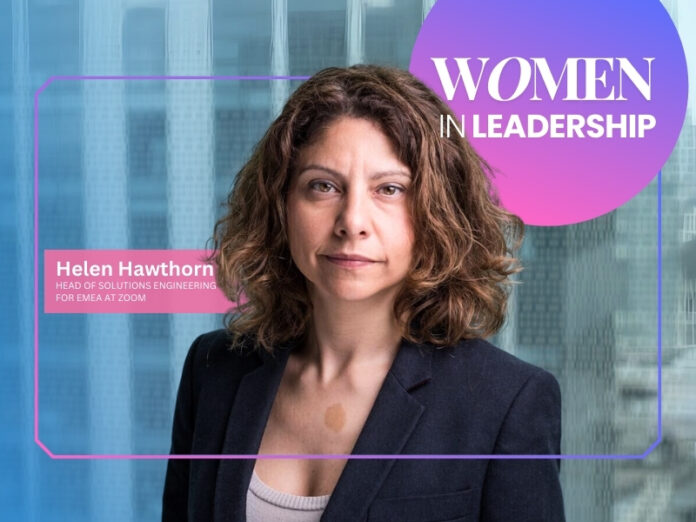By Helen Hawthorn
Technology leaders can no longer afford to ignore the power of women’s voices in driving innovation and productivity in fields such as AI and hybrid working. Helen’s experiences in the industry have inspired her to champion women in tech, showing how important female perspectives are within business – and inspiring her to champion female recruitment from primary school onwards.
For technology companies, the value that female leaders can bring to the business is not something that can be ignored. Women are absolutely vital to driving a culture of collaboration, fostering innovation and productivity, and getting the most from technologies such as artificial intelligence (AI) and collaboration technology. They bring invaluable perspectives and experience, and help companies adopt technologies in a way that works for everyone.
Women approach customers and colleagues with a nuanced sensitivity, being able to empathise and step into their shoes. Similarly, when it comes to business goals, we think beyond financials and prioritise the day-to-day wellbeing of employees. However, even today, when you enter the boardroom of one of the big technology giants you will often be greeted by a predominantly white male team.
My own experience in the technology industry has made me determined to show women what is possible, and challenge the ‘old boy’s club’ mindset. The first time I was a speaker at a global sales conference, I overheard that the conference was ‘looking for a woman’ to fill the slot. Instead of feeling discouraged and that I’d been chosen simply for my gender, it motivated me even more to give a talk which showed the value I bring, my skills and my expertise. Those sorts of experiences moulded me, and made me more determined than ever to champion the benefits of having women in the technology sector, which starts with supporting women with technology and making girls aware, from a young age, the many opportunities available.
Driving innovation, boosting productivity
Women, and diversity more generally, are key to getting the most from technologies such as AI. Inclusivity in AI development teams is vital: AI algorithms trained on biassed data can perpetuate inequalities and stereotypes that women have fought against, and also limit the usefulness of the technology. By promoting diversity and conducting a bias assessment, we can mitigate gender-based AI discrimination, and deliver genuinely useful AI systems which can be used safely in everything from healthcare to finance.
Communication technologies are now offering ways to help people work asynchronously, which can be a huge help to new working mothers, which I know, from experience, can be a tricky, guilt-ridden time to navigate. I was able to work from home both during pregnancy and during my child’s early years, picking up my child from school and being able to attend concerts and sports days. I am happy that the technology that is central to my role has also enabled me to work effectively from home and to climb into a senior management role. Without this technology, I’m not sure I could have achieved it.
Strategies to boost inclusivity
All big technology companies have a responsibility to engage with schools and local community projects, to showcase the problem-solving that will inspire girls to pursue STEM careers. It’s so crucial to engage with young girls at the primary school stage: many companies focus on university, but it’s already too late by that point. It needs to start early because girls, in particular, are put off because they don’t really understand that there’s so many different roles in technology.
We also need to rethink the way interview and hiring processes work, in terms of understanding what people can bring to the party and what a ‘technical person’ is. It’s about ensuring job descriptions aren’t written in a way that puts people off. It’s been proven that a woman, or person of colour, looks at a job description and wants to hit every single part of it. What they’re trying to do is ‘let me make sure that I’m the best of the best before I even walk through the door’, whereas some people will see one line they can do and think they could get the job. We’ve got to become better in our interview process in terms of who’s interviewing them, what that looks like, and how we interview. We talk about technology and when you’re interviewing, you’ve got to use the right tools to get the best out of them in an interview.
A career-defining moment for me was in my mid-20s when I was offered the opportunity to become a manager. Initially, I hesitated, especially when I learned that I would be managing eight men, who were the same age as my Dad. Despite the challenges I faced, they came to realise I knew what I was talking about. At Zoom, we proactively seek out women for early-career roles, and we already have a close to 50/50 split between men and women in those roles, which is a step in the right direction. Big technology companies have a vital role to play in driving women’s entrepreneurship, not only through recruitment and developing talent, but also by designing infrastructure to meet women’s needs in terms of hybrid working and support for mothers.
A fairer future
With the technology industry driving towards an AI-powered, hybrid-working future, it’s never been more vital to listen to the voices of women, and ensure they have the opportunity to take leadership roles. Doing so will not only mitigate problems such as AI bias, it will pave the way for boardrooms full of diverse voices, ready to come up with new and challenging ideas. To get to this point, technology companies need to improve how they reach out to young women, and ensure the hiring process does not deter potential candidates. By doing so, we can create a fairer industry, and a brighter future for technology.





































